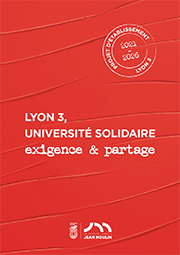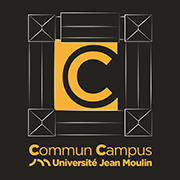AccueilRechercheLes productions scientifiquesThèsesThèses soutenuesThèses soutenues - 2006-2020Thèses soutenues - 2013
-
Partager cette page
- Recherche,
BUCUR Dorel
Autrui : comportement, corps, chair (chez Maurice Merleau-Ponty)
Publié le 11 avril 2013 – Mis à jour le 5 décembre 2013
Thèse en Philosophie - Etude des systèmes soutenue le 29 mars 2013
La philosophie de la subjectivité culmine chez Husserl avec la paradoxale nécessité de fonder cette philosophie dans une communauté de sujets. Par un même mouvement, la phénoménologie husserlienne dévoile la personne cachée du philosophe, le moi phénoménologique, et autrui sur lequel le moi méditant cherche appui. Désormais, avec l’apparition de la phénoménologie, la problématique d’autrui s’installe au cœur de la philosophie directement liée à celle de la subjectivité.
Sans être explicitement l’objet de sa philosophie, le problème d’autrui est constamment présent chez Merleau-Ponty. Si le plus grand problème concernant la question d’autrui de la Cinquième méditation husserlienne était celui de poser ce problème en partant de l’ego constituant, qui se pose comme une subjectivité autosuffisante, dans La structure du comportement, le comportement comme structure (Gestalt) pose un premier décentrement de la subjectivité, qui laisse ainsi de la place pour la question d’autrui. Ce travail de décentrement se poursuit avec l’analyse du corps propre, lequel dans la Phénoménologie de la perception, est entendu comme une subjectivité plus originaire que la conscience. Enfin, dans Le visible et l’invisible, Merleau-Ponty aborde la question d’autrui directement en lien avec la question de l’être. En réhabilitant la notion de forme, il ne s’agit plus seulement de revenir à la question de la subjectivité, mais de remettre en question la réflexion en quête l’être. L’incarnation présuppose une négativité constitutive, que la réflexion doit assumer et qui doit la conduire à refuser tout primat du sujet (ego). Dans l’être comme chair il n’y a plus de place privilégiée, ni pour moi, ni pour autrui, ni même pour notre rapport. Cette philosophie de la chair apparaît donc comme une ontologie indirecte, capable d’embrasser pleinement la question d’autrui dans tous ses paradoxes.
Husserl’s late philosophy is confronted with a paradoxical necessity: founding this philosophy on a community of subjects. At the same time, the Husserlian phenomenology shows out the person sitting behind phenomenological reflection but also the Other in which the phenomenological philosopher tries to find assistance. Thus, along with the emergence of the phenomenology, the problem of the Other is placed at the core of the philosophy directly connected to the question of the subjectivity.
The question of the Other, despite not being the central point of his philosophy, is constantly present in the Merleau-Ponty’s philosophy. If in the Husserl’s Fifth Cartesian Mediation the most difficult problem concerning the question of the Other is precisely the fact that this question is being asked by what it seems to be an autosufficient subjectivity, in The Structure of Behavior, the notion of the behavior as structure (Gestalt) accomplishes already a decentering of the human subjectivity, freeing the ground for the question of the Other. In the Phenomenology of Perception, this work of decentering is being continued with the analysis of the body, showing that the corporeal subjectivity precedes the conscience. Finally, in The Visible and the Invisible, Merleau-Ponty investigates the question of the Other along with the question of Being. In reevaluating the notion of structure, it is now not only a question of subjectivity but of how the reflection limits itself to a positive questing of the Being. The incarnation implies a degree of negativity that reflection has to presume and the very consequence of that is there’s no longer a privileged place for a constitutive subject (ego). In the Being of flesh, there’s no longer a privileged place for me, or for the other, or for our relation. It’s only in its final philosophy of the flesh, the indirect ontology, that the question of the Other can be accepted with all its constitutives paradoxes.
Mots clés : autrui, comportement comme structure, corps, chair, structure, Gestalt, intersubjectivité, théologie négative, philosophie du négatif, ontologie indirecte
Key words : the other, behavior as structure, body, flesh, structure, Gestalt, intersubjectivity, negative theology, the philosophy of negative, the indirect ontology
Directeur de thèse : Jean-Jacques WUNENBURGER
Sans être explicitement l’objet de sa philosophie, le problème d’autrui est constamment présent chez Merleau-Ponty. Si le plus grand problème concernant la question d’autrui de la Cinquième méditation husserlienne était celui de poser ce problème en partant de l’ego constituant, qui se pose comme une subjectivité autosuffisante, dans La structure du comportement, le comportement comme structure (Gestalt) pose un premier décentrement de la subjectivité, qui laisse ainsi de la place pour la question d’autrui. Ce travail de décentrement se poursuit avec l’analyse du corps propre, lequel dans la Phénoménologie de la perception, est entendu comme une subjectivité plus originaire que la conscience. Enfin, dans Le visible et l’invisible, Merleau-Ponty aborde la question d’autrui directement en lien avec la question de l’être. En réhabilitant la notion de forme, il ne s’agit plus seulement de revenir à la question de la subjectivité, mais de remettre en question la réflexion en quête l’être. L’incarnation présuppose une négativité constitutive, que la réflexion doit assumer et qui doit la conduire à refuser tout primat du sujet (ego). Dans l’être comme chair il n’y a plus de place privilégiée, ni pour moi, ni pour autrui, ni même pour notre rapport. Cette philosophie de la chair apparaît donc comme une ontologie indirecte, capable d’embrasser pleinement la question d’autrui dans tous ses paradoxes.
Husserl’s late philosophy is confronted with a paradoxical necessity: founding this philosophy on a community of subjects. At the same time, the Husserlian phenomenology shows out the person sitting behind phenomenological reflection but also the Other in which the phenomenological philosopher tries to find assistance. Thus, along with the emergence of the phenomenology, the problem of the Other is placed at the core of the philosophy directly connected to the question of the subjectivity.
The question of the Other, despite not being the central point of his philosophy, is constantly present in the Merleau-Ponty’s philosophy. If in the Husserl’s Fifth Cartesian Mediation the most difficult problem concerning the question of the Other is precisely the fact that this question is being asked by what it seems to be an autosufficient subjectivity, in The Structure of Behavior, the notion of the behavior as structure (Gestalt) accomplishes already a decentering of the human subjectivity, freeing the ground for the question of the Other. In the Phenomenology of Perception, this work of decentering is being continued with the analysis of the body, showing that the corporeal subjectivity precedes the conscience. Finally, in The Visible and the Invisible, Merleau-Ponty investigates the question of the Other along with the question of Being. In reevaluating the notion of structure, it is now not only a question of subjectivity but of how the reflection limits itself to a positive questing of the Being. The incarnation implies a degree of negativity that reflection has to presume and the very consequence of that is there’s no longer a privileged place for a constitutive subject (ego). In the Being of flesh, there’s no longer a privileged place for me, or for the other, or for our relation. It’s only in its final philosophy of the flesh, the indirect ontology, that the question of the Other can be accepted with all its constitutives paradoxes.
Mots clés : autrui, comportement comme structure, corps, chair, structure, Gestalt, intersubjectivité, théologie négative, philosophie du négatif, ontologie indirecte
Key words : the other, behavior as structure, body, flesh, structure, Gestalt, intersubjectivity, negative theology, the philosophy of negative, the indirect ontology
Directeur de thèse : Jean-Jacques WUNENBURGER
Membres du jury :
Nathalie DEPRAZ, Professeur, Université de Rouen
Philippe CABESTAN, Professeur CPGE HDR, Lycée J. de Sailly, Paris
Etienne BIMBENET, Maître de conférences HDR, Université Jean Moulin Lyon 3
Jean-Jacques WUNENBURGER, Professeur, Université Jean Moulin Lyon 3
Président du jury : Nathalie DEPRAZ
Mention : Très honorable
Equipe d'accueil : IRPHIL
Documentation
Mise à jour : 5 décembre 2013



